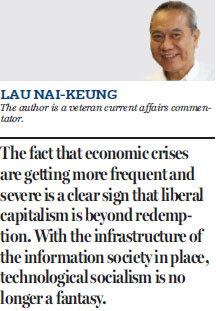Technological innovations will lead us finally to socialism
Updated: 2017-01-10 07:36
By Lau Nai-keung(HK Edition)
|
|||||||||
In the 1970s, Chile's top planners brought Stafford Beer in as a consultant to help guide the country down what Salvador Allende, its democratically elected Marxist leader, was calling "the Chilean road to socialism". Beer, who had served as an executive with United Steel and worked as a development director for the International Publishing Corporation (then one of the largest media companies in the world), was a leading theorist of cybernetics - a discipline born of mid-century efforts to understand the role of communication in controlling social, biological, and technical systems.
Chile's government had a lot to control: Allende, who took office in November of 1970, had swiftly nationalized the country's key industries, and he promised "worker participation" in the planning process. Beer's mission was to deliver a hypermodern information system that would make this possible, and so bring a type of socialism into the computer age. The system he devised had a gleaming, sci-fi name: Project Cybersyn.
Project Cybersyn was very futuristic. According to technology writer Evgeny Morozov who has written about the subject in the New Yorker, "There was a screen that simulated the future state of the Chilean economy under various conditions. Before you set prices, established production quotas, or shifted petroleum allocations, you could see how your decision would play out."

As good as the whole thing sounded, Project Cybersyn failed because the computing power required wasn't there yet. Chile was also being cut off by the US and therefore lacked critical resources to implement the project.
Project Cybersyn and similar attempts that have failed are reasons why people laughed about the idea that the economy can be planned back in the days. There were so many variables. How can we capture all the data, let alone making use of them? Today, such an idea no longer sounds absurd or even radical. After all, some of it has already happened. The Didi taxi that picked me up right after I booked with my app wasn't there by chance. Big data and predictive analytics were at work.
Today, we are all connected through the internet and with our phones. The Internet of Things, or the interconnectivity of smart devices, allows objects to be sensed and/or controlled remotely across existing network infrastructure. This creates opportunities for more direct integration of the physical world into computer-based systems. It results in improved efficiency, accuracy and economic benefit.
All of these make a form of socialism not only possible, but imminent.
The basis of the capitalist system is production for the sake of profit. Contrary to what capitalist economists would argue, capitalism does not produce on the basis of what is needed in society, but on the basis of what is profitable. In order to survive, each capitalist must make profits, and therefore an endless stream of commodities must be pumped into the market. Eventually the market reaches a breaking point as it becomes saturated by commodities which cannot be sold profitably; the system ends up in crisis - crises of overproduction.
The crises of overproduction are the reason why we have long-term and short-term economic cycles. Efficiency alone is not the solution to these crises. The more we can produce, the more we overproduce. Likewise, globalization only lengthens the cycle but does not eliminate it. When the whole world, including the emerging markets, is saturated by commodities, we find ourselves at an even larger crisis.
The fact that economic crises are getting more frequent and severe is a clear sign that liberal capitalism is beyond redemption. With the infrastructure of the information society in place, technological socialism is no longer a fantasy.
China's central and local governments, including Hong Kong's, have all emphasized innovation and entrepreneurship in recent years. While this is no doubt the correct direction, we have to ask a more important question: Who is driving the systemic, society-wide innovations?
China's technology giants such as Alipay are now building big data-enabled credit rating systems, many of which may have features that infringe on users' privacy. Our society is in dire need of building trust, and it can use a good credit rating system. What is not clear is why this important function is relegated to a commercial entity that is listed overseas.
Hong Kong is supposed to be more cosmopolitan and agile. If we are more aware of technological trends and can anticipate the needs arising, there is a niche we can exploit for the benefit of our country and of Hong Kong.
(HK Edition 01/10/2017 page10)